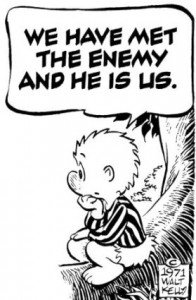 Unless you are of a philosophical bent you might want to skip this last installment of the spotted owl trilogy. I have been intrigued by the dichotomy of man vs. nature for a long time. I can’t remember exactly what I saw while researching the spotted owl dilemma – the need to kill barred owls in order to save endangered spotted owls – that brought this man vs. nature dualism back into focus once again. It may have simply been the implication that man was, somehow, this omnipotent arbiter sitting outside that out-of-balance ecosystem with the knowledge and power to bring it back into balance by simply manipulating one small aspect – the number of barred owls, with only a cursory mention that – oh, by the way it was human activities like the logging of million of acres of old growth forests in the Pacific Northwest coupled with the human-induced expansion of forests across the northern plains and southern Canada in the 1800s that brought these two owls into proximity in the first place.
Unless you are of a philosophical bent you might want to skip this last installment of the spotted owl trilogy. I have been intrigued by the dichotomy of man vs. nature for a long time. I can’t remember exactly what I saw while researching the spotted owl dilemma – the need to kill barred owls in order to save endangered spotted owls – that brought this man vs. nature dualism back into focus once again. It may have simply been the implication that man was, somehow, this omnipotent arbiter sitting outside that out-of-balance ecosystem with the knowledge and power to bring it back into balance by simply manipulating one small aspect – the number of barred owls, with only a cursory mention that – oh, by the way it was human activities like the logging of million of acres of old growth forests in the Pacific Northwest coupled with the human-induced expansion of forests across the northern plains and southern Canada in the 1800s that brought these two owls into proximity in the first place.
The strange thing about this man vs. nature dualism is that proponents and opponents of the anthropocentric exploitation of natural resources often find themselves supporting this idea of dualism if it appears to advance their particular agenda. You have logging companies, mining companies and real estate developers etc. and their constituents who realize a livelihood and a lifestyle from clearing forests or extracting natural resources or manipulating them in a certain way that makes them more manageable or more profitable. And you have some environmental advocates who have gone so far as to posit that there should be large expanses of natural landscape with no type of human footprint at all.
In my, obviously, rather simpleminded observations what you have is the opposite sides of the same coin. You can no more separate man from the environment than you can take fish from the water. Man is part and parcel of the environment and everything/anything man (you or I) does down to the breath he takes impacts the environment in some way.
It should be apparent that all natural resources aren’t renewable and/or reusable and that even some that might be, over time can’t be renewed at the rate we are using them up. And it should be just as obvious that there will never be a wilderness beyond the footprint of man. Vast expanses of sparsely inhabited wilderness greeted Europeans when they arrived in America only a few hundred years ago – and you see what’s left now.
And I am simple enough to believe in the theory of evolution and natural selection and I have little doubt that while a cave may have been inhabitable that those individuals that learned to use natural resources to create their own habitation in areas that had more readily available or better resources certainly had a leg up. And that ever sense we crawled out of those caves and began to learn how to utilize the natural resources that we encountered – it’s always been those who were either more adept at utilizing those resources or those who were strong enough to amass the most resources who had the upper hand when it came to survival and advancing the species.
As Homo sapiens has evolved one can only hope that the depth and breadth of his wisdom and compassion have evolved to the point, where he realizes as Pogo succinctly put it “We have met the enemy and he is us.”
No one, least of all I, wants to crawl back into the cave. And no one believes that the polio or smallpox virus should not be eradicated. But we are fouling our nest like no other species in history and we are not only fouling the physical aspects that provide sustenance for our bodies we are fouling the spiritual aspects that sustain our spirit and give us the capacity for awe and wonder and love and the lost of that awe and wonder and love will be what brings about Armageddon.
“The universe is a communion of subjects not a collection of objects.” Thomas Berry
